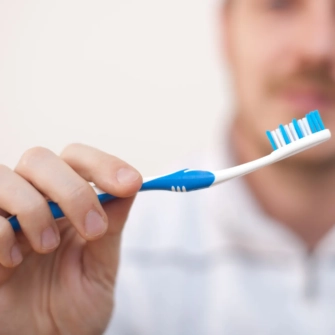Maintaining Your Child’s Dental Hygiene
You can always contact your local Clyde Munro dental practice for guidance and to address any concerns.
Published: 22 January 2024
As adults, we understand the importance of maintaining good oral hygiene. We appreciate the consequences to our health when we don’t brush our teeth twice a day. And the benefits of flossing, looking after our gums, regularly visiting the dentist, and monitoring what we eat and when we eat it.
All habits we are never too young to start implementing. But the younger the little people in your life are, the more guidance they will need from you. You can always contact your local Clyde Munro dental practice for advice and to address any concerns. However, following some of these essential tips should keep your dental visits to a minimum, as much as we enjoy seeing our patients.
When should children start cleaning their teeth? Should babies have their teeth cleaned?
Children should start brushing their teeth when their first tooth appears, usually within the first six months of birth. It may be easier to clean their teeth sitting in a high chair or on your lap with their heads resting against your chest.
Use small circular motions, ensuring all surfaces of the teeth are covered. It’s unlikely that your child will master the art of spitting, but provided you use the right toothpaste and the right amount, swallowing a small amount won’t cause them any harm.
It should be more common practice than it is, but you can start to use floss when the gap between your child’s adjacent teeth begins to close. Not only is this beneficial for better oral health, but it also establishes a good routine for the future. You will be able to find child-friendly floss from reputable brands. They are designed to appeal to children with their vibrant colours, fruit-flavoured floss, and ergonomic design, making them easier for older children to manage.
How long should my children brush their teeth? Do they need to brush for 2 minutes?
They may be much smaller than our adult teeth and, for a while, a lot fewer of them, but from the moment of their first tooth, it’s important to establish a routine for cleaning babies’ teeth. Twice a day for 2 minutes at a time. Ideally, prior to going to bed for the night (fingers crossed) and at some point during the morning.
This may seem like an incredibly long time when you have a crying baby who is suffering the pain of teething or a struggling infant. Do as long as you can. At this age, cleaning your child’s teeth is just as much about getting them used to the sensation and the routine.
As adults, it’s recommended to ‘brush and spit’ there’s no need to rinse as this actually removes most of the fluoride you’ve just applied to your teeth. The same applies to children. ‘Brush and spit’. There is no need to rinse. And because the fluoride levels are so low, provided the recommended amount of toothpaste is used, there is no harm done if it’s more ‘brush and swallow’.
What type of toothbrush and toothpaste should I use to clean my children’s teeth, and how much should I use?
Children must always use an age-appropriate toothpaste with the correct amount of fluoride. Too much can be as damaging as too little. Always check the packaging or speak to your local dentist for advice.
We want the experience of children cleaning their teeth to be positive. So make it as much fun as possible. Look for toothpaste tubes with your child’s favourite character, and try different flavours. The traditional mint flavour often tastes ‘spicy’ to a child and is not as refreshing to them as it is to you. You can even find toothpastes that change colour as you brush. However, always remember that the priority in choosing your child’s toothpaste should be that it has the right amount of fluoride for their age, no matter how appealing the packaging may be.
Children up to 3 require no more than a smear of toothpaste applied directly to the toothbrush.
Between 3 and 6 years old, you can begin to use a pea-sized amount of toothpaste. Although your child is getting older, we still recommend you clean their teeth for them. It’s a great time to teach them how to brush effectively and to understand why it’s so important to clean your teeth.
At 7, your child should be able to brush their teeth, although we advise they are supervised to ensure no corners are cut. We know children develop differently, so don’t worry if your child still needs help. Their dental health is far more critical at this stage than who is brushing their teeth. As they start to become a little more independent, keep an eye on what type of snacks they’re reaching for. Help them choose the right food and drink, explaining how too much sugar can lead to tooth decay.
To help your child brush for the full two minutes, try using a special app such as Brush DJ or the Oral-B Disney Magic Timer that awards badges and prizes. And it’s always worth reminding them that the ‘tooth fairy’ only rewards nice, clean teeth.
Always use a toothbrush with soft bristles to reduce any potential damage to the gums. There are several baby, toddler and age-suitable toothbrushes to choose from, including finger brushes, which can be more comfortable during the painful stages of teething. You can also find ergonomic toothbrushes which help younger children better clean those hard-to-reach teeth.
Establishing a dental routine
Part of maintaining a great oral care regime is regular dental visits. We advise bringing your child to the dental practice as early as possible and even to your own appointments. This helps them become used to the sights, sounds, and smells of the clinic, meaning that when the time comes for their first appointment, they will be more confident and less wary of seeing their dentist.
A child’s first dental check-up should be around six months or when the first tooth appears. Your dentist will advise how often to attend for optimum children’s dental care, and your dental team will provide useful tips and advice as your child grows and develops. They can show you toothbrushing and flossing techniques that can make it easy and fun for you and your child and answer any questions you might have. Think of them as part of your extended support network.
Signs to look out for that indicate your child’s mouth is unhealthy.
“They’re only milk teeth, so how much does it matter how much and how well you clean them? They’ll soon be replaced with new teeth. We’ll do a better job with them.”
Looking after your children’s teeth and developing good dental hygiene habits isn’t just about having a great smile. We all have a significant connection between our mouth and the rest of the body, called the oral-systemic link. The health of your child’s mouth directly impacts their overall health.
Studies have shown that poor children’s oral health is linked to numerous health concerns, including, amongst others, heart conditions, diabetes, and inflammation.
Of course, poor oral health can lead to tooth decay and tooth loss, which can impact the mental health of a child. Kids with decayed teeth, bad breath, or gaps in their smile may endure bullying at school, and although we expect to lose milk teeth, when these teeth fall out before they are due to, this can impact how well the adult teeth grow in.
For these reasons, establishing excellent oral health in the early years of a person’s life is crucial. While getting children to brush their teeth can be a daily battle, both morning and night, it is one worth fighting – and ultimately one they will thank you for in later life.
What causes sensitivity in children’s teeth, and how can it be treated?
If a child experiences discomfort when drinking cold water, they likely suffer from sensitive teeth. Whilst sensitivity in children’s teeth is rare, it can be an issue for some. Many reasons can cause sensitivity, some of which relate to other underlying health conditions. Therefore, having a dentist check your child before self-diagnosing or using any over-the-counter remedies is always advisable.
The most common factor is when the dentine becomes exposed due to a lack of protection from the tooth enamel. This can be caused by a crack or chip in the tooth, erosion caused by acidic foods and drinks, tooth decay, or receding gums, which may be caused by gum disease.
Several kinds of toothpaste and mouthwash are available to help alleviate symptoms, but in children, these could exacerbate the problem, so always seek professional advice from your local dentist first.
To minimise the likelihood of your child suffering from sensitive teeth, they must always maintain good dental hygiene, brush teeth for 2 minutes twice daily, eat a healthy diet, and regularly visit the dentist.
Dental tips for children that can be shared with the whole family
- Start good oral care early. Incorporating a toothbrushing and flossing routine twice daily helps instill great oral health habits that are more likely to last into adulthood.
- Regular use of fluoride. Using fluoride helps to protect the teeth, which is why we always recommend using fluoride-containing toothpaste. Different ones are available for different ages, and it’s important to use the correct one for your child. Too much or too little fluoride can be harmful to developing teeth. If you are unsure, your dental team can help.
- Consider fluoride varnish. Regarding fluoride, we are pleased to provide fluoride varnishing in our Clyde Munro clinics as part of our work with Childsmile. This provides extra protection against tooth decay, is quickly and easily applied, and tastes nice too. The service is free of charge and offered twice a year.
- Limit or avoid sugary food and drinks. We all know that sugar is your dentist’s worst enemy because regular consumption can lead to dental decay and cavities. While we are not opposed to the odd treat here and there, it is important to limit how much your child has and how often they have it.
- Visit the dentist. Regular dental check-ups are vital for maintaining great oral health, as we can spot problems early on before they become too serious. We are here to provide support and help you care for your child’s teeth through our variety of children’s dentistry services, and we enjoy seeing our young patients grow into healthy adults with beautiful, healthy smiles!
We would love to have your family join the Clyde Munro dental family. Please contact your local Clyde Munro practice today and let’s chat about how best we can help you.
If you enjoyed reading this blog, you may also like:
- 5 Tooth-Friendly Tricks for a Healthy Halloween
- Healthy Smiles Are Happy Smiles
- Volunteering dentists treat more than 100 children for vital hygiene treatment





